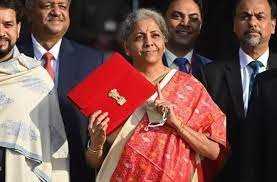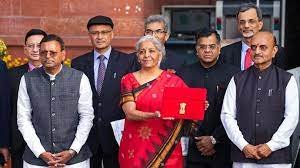Interim Budget 2024: Your Dictionary for All Key Terms
The interim budget for the fiscal year 2024 has been a focal point of discussions, particularly for aspirants preparing for government exams. As candidates gearing up for positions ranging from teachers and police officers to banking, railways, defense, and civil services, including PSCS to IAS, it is crucial to grasp the intricacies of the budgetary terminology.

Why this News is Important
Simplifying Complex Jargon
Understanding budget-related jargon is not only crucial for acing exams but also for comprehending the government’s financial decisions that directly impact the country’s economy. This news serves as a comprehensive guide to decoding intricate terms that often pose challenges to aspirants.
Exam Relevance
For candidates eyeing various government positions, the knowledge of budget-related terms is indispensable. Whether it’s comprehending fiscal deficit or grasping the nuances of revenue expenditure, this news brings forth information tailored to the exam syllabi.
Historical Context
To fully appreciate the significance of the interim budget, it’s essential to delve into its historical context. Interim budgets have been a recurring aspect of India’s fiscal policies, ensuring continuity in government expenditure during the transition between two full-fledged budgets.
Key Takeaways from “Interim Budget 2024: Your Dictionary for All Key Terms”
| Serial Number | Key Takeaway |
|---|---|
| 1 | Fiscal Deficit: A comprehensive understanding of the difference between total revenue and total expenditure. |
| 2 | Revenue Expenditure vs. Capital Expenditure: Distinguishing between day-to-day expenses and long-term investments. |
| 3 | Direct vs. Indirect Taxes: Knowing the variances in taxation structures and their impact on citizens. |
| 4 | GDP Growth Projection: Grasping the forecasted economic growth and its implications. |
| 5 | Social Sector Allocations: Understanding budgetary allocations for education, health, and welfare initiatives. |
Important FAQs for Students from this News
Q1: Why is understanding the interim budget important for government exam aspirants?
A: Understanding the interim budget is crucial as it provides insights into economic policies and financial terms likely to appear in exams, enhancing the candidate’s comprehension of government decisions.
Q2: How does historical context contribute to the significance of the interim budget?
A: Examining historical context helps aspirants grasp the recurring nature of interim budgets, ensuring continuity in government expenditure during the transition between two full-fledged budgets.
Q3: Why is decoding budget-related jargon essential for aspirants?
A: Decoding jargon is pivotal for acing exams and understanding government financial decisions that directly impact the country’s economy.
Q4: What are the key takeaways that candidates should focus on from the interim budget?
A: Key takeaways include understanding fiscal deficit, differentiating revenue and capital expenditure, recognizing direct and indirect taxes, interpreting GDP growth projections, and comprehending social sector allocations.
Q5: How does the knowledge of budget-related terms benefit aspirants beyond exams?
A: Beyond exams, this knowledge equips aspirants to navigate the economic pulse of the nation, making them more informed citizens and potentially influencing their professional roles in the government.
Some Important Current Affairs Links

















